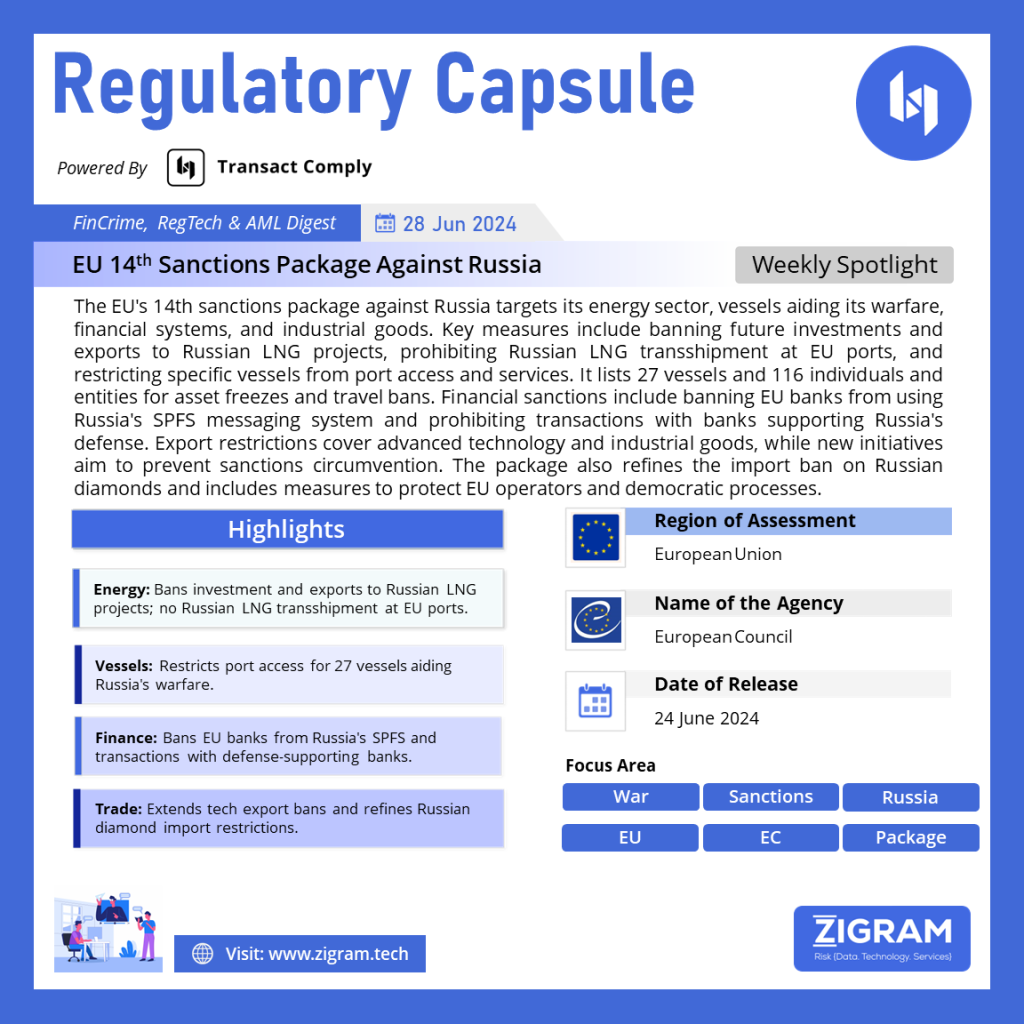Regulation Name: EU 14th Sanction Package Against Russia
Publishing Date: 24 June 2024
Region: European Union
Agency: European Council
The European Union has adopted its 14th sanctions package in response to Russia’s ongoing aggression against Ukraine, introducing a series of stringent measures aimed at crippling Russia’s ability to finance and sustain its military operations.
Key Measures Targeting Energy and Vessels
A significant focus of the new sanctions is the energy sector, specifically targeting liquefied natural gas (LNG). The package bans future investments and exports to Russian LNG projects under construction and prohibits the use of EU ports for Russian LNG transshipment after a nine-month transition period. Additionally, certain terminals not connected to the EU gas pipeline network are barred from importing Russian LNG.
For the first time, the EU has imposed sanctions on specific vessels aiding Russia’s war efforts. A total of 27 vessels, involved in activities such as transporting military equipment, stolen Ukrainian grain, and supporting Russia’s energy sector, are now subject to a port access ban and a prohibition on receiving services. This includes tankers circumventing international sanctions and engaging in deceptive shipping practices.
Financial Sector Crackdown
The sanctions also aim to sever Russia’s financial networks. EU banks outside Russia are now banned from using the Russian SPFS financial messaging system, akin to SWIFT. Furthermore, the EU can list non-Russian third-country banks connected to SPFS, prohibiting them from conducting business with EU operators. Transactions with banks and crypto asset providers in Russia and third countries that facilitate defense-related activities are also banned.
Export and Import Restrictions
To further undermine Russia’s revenue streams and technological capabilities, the EU has expanded its export restrictions. Nine additional dual-use and advanced technology items, including flight data recorders and all-terrain vehicles, are now restricted. Export bans extend to industrial products such as chemicals, plastics, vehicle parts, and machinery, previously valued at EUR 5 billion in 2021. The package also prohibits the export and transfer of manganese ore.
Moreover, stricter controls are imposed on dual-use and advanced technology exports to 61 entities associated with Russia’s military complex, including 28 within Russia and 33 in third countries. The import ban now includes helium, a significant revenue source for Russia.
Measures Against Sanctions Circumvention
Recognizing Russia’s attempts to circumvent existing sanctions, the EU has introduced measures to enhance enforcement and compliance. These include initiatives to ensure private sector adherence, support national authorities, and monitor foreign subsidiaries of EU operators. Protections against expropriation and responses to illegitimate actions, such as intellectual property theft by the Russian state, are also part of the package.
Diamond Trade and Democratic Protections
The new sanctions fine-tune the existing import ban on Russian diamonds, introducing ‘grandfathering’ provisions for diamonds already outside Russia before the ban and allowing temporary imports or exports for specific purposes. The full traceability scheme for rough and polished diamonds will be mandatory from March 2025, with the Council to decide on further measures in coordination with the G7.
To safeguard democratic processes, the package includes prohibitions on political parties receiving funding from the Russian state and strengthens existing transport restrictions, such as the flight ban and road transport prohibition.
The EU’s 14th sanctions package reflects a robust and unified stance against Russia’s aggression in Ukraine. By targeting critical sectors and enhancing enforcement mechanisms, the EU aims to diminish Russia’s capacity to wage war and support Ukraine’s sovereignty and independence.
Read the full notice here.
- #EUSanctions
- #UkraineSupport
- #RussiaSanctions
- #EnergySecurity
- #FinancialSanctions
- #TradeRestrictions
- #EUUnity
- #DefendDemocracy

